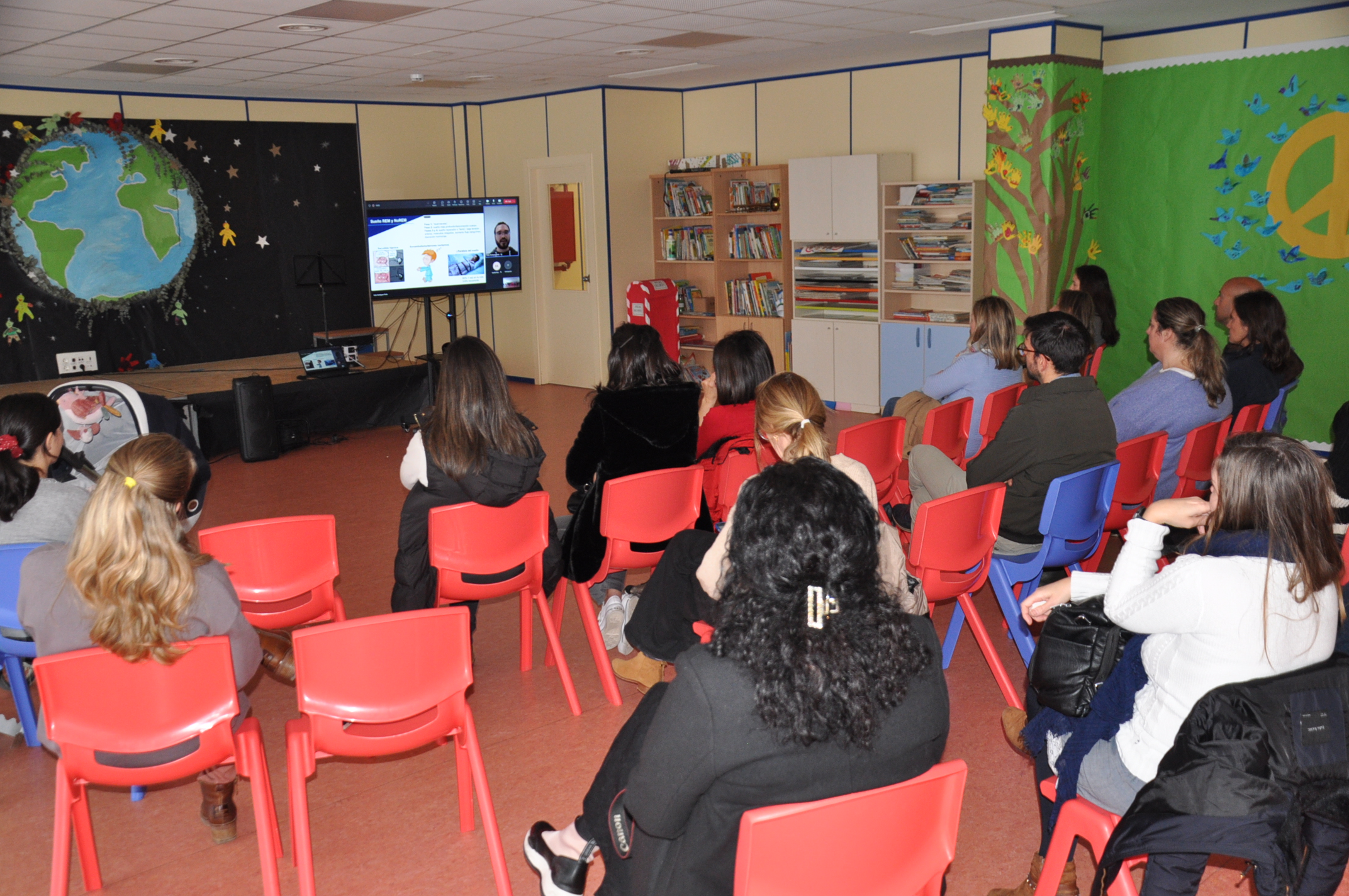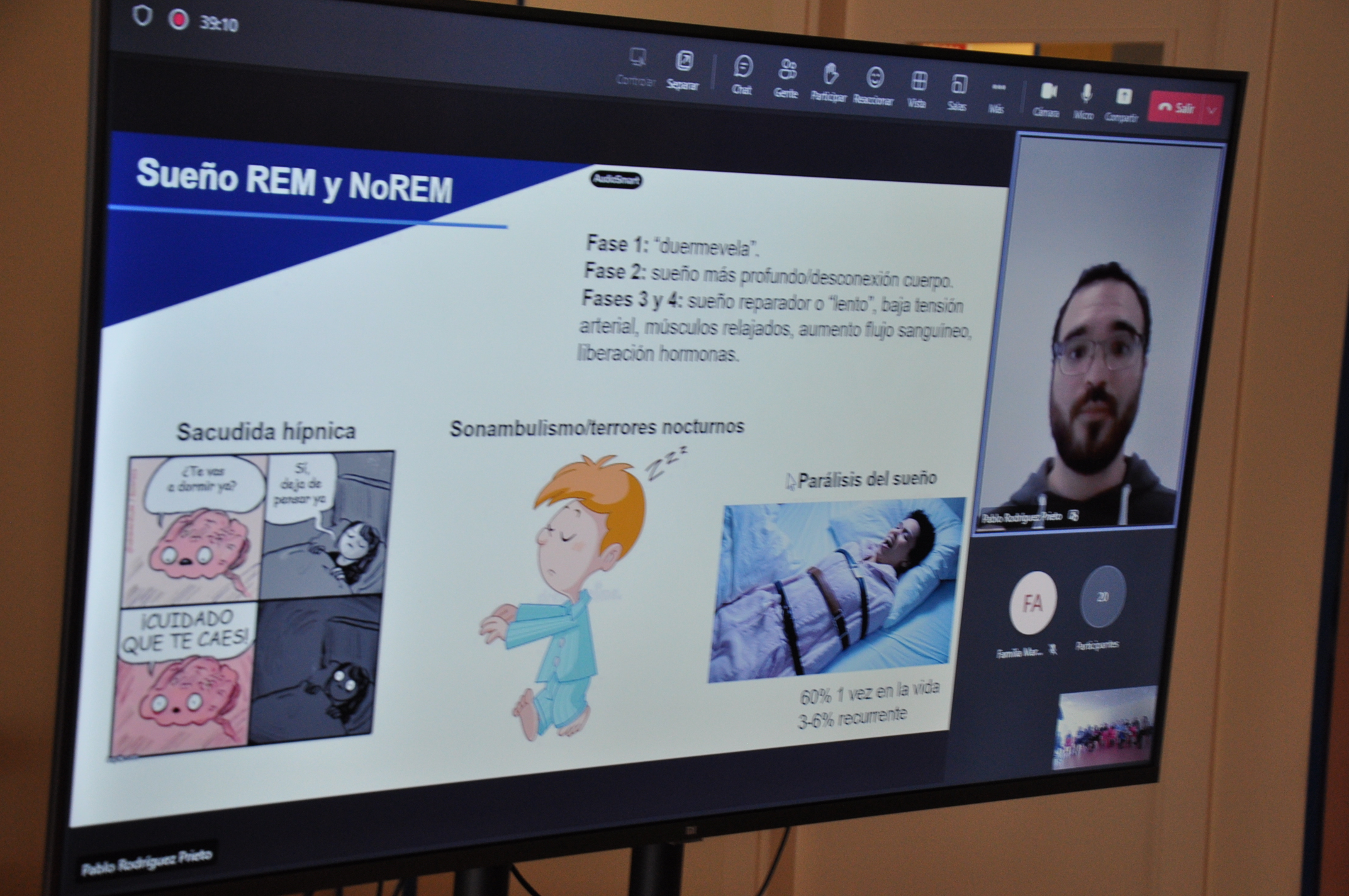Es una realidad y cada vez se sabe más según investigaciones recientes, que el sueño es esencial para la salud y el desarrollo de niños.
El sueño promueve el sentirse alerta, tener buena memoria y tener una mejor actitud, etc. Los niños que duermen lo suficiente y bien, se desenvuelven mejor y son menos propensos a problemas de comportamiento e irritabilidad. Es por ello, que es importante que las familias ayuden a sus niños a desarrollar buenos hábitos de dormir desde una edad temprana, inculcándoles una rutina bien asentada que permita que nuestros peques obtengan una buena higiene del sueño para su desarrollo.
Esta semana hemos organizado, el equipo de EAT y el Departamento de Orientación en colaboración con la Universidad de Loyola Andalucía Sevilla y taller dirigido a las familias del Centro.
En esta ocasión hemos contado con D. Pablo Rodríguez Prieto, especialista en sueño perteneciente al departamento de Psicología y Neurociencia Humana de la Universidad, quién nos ofreció una interesante charla sobre el sueño y su importancia en la calidad de vida en los niños y jóvenes.
D. Pablo, comenzó explicando las características del sueño en general, tal y como atañe a todas las personas, aclarando que el sueño es un ciclo de 24 horas (y no sólo de las 8, o 6, o 10 que pueda dormir una persona. Es decir, que lo que hacemos durante el día influye en la calidad y duración de nuestro sueño.
Posteriormente, fue desgranando características y circunstancias que influyen en la calidad del sueño y sobre las que se puede intervenir de diferentes formas.
Recalcó la importancia de una buena higiene de sueño, estableciendo rutinas que la favorezcan, algunas generales, como no exponer a los niños a pantallas al menos desde dos horas antes de la hora de acostarse.
También destacó que es importante ajustar nuestras expectativas como familias a la respuesta de cada niño (no todos los niños duermen la misma cantidad de tiempo, y dormir menos horas no supone dormir peor).
Hizo una especial aclaración y es que a medida que crecemos, sobre todos los jóvenes, pasan a dormir menos tiempo y eso puede derivar en múltiples problemas a largo plazo.
El sueño es reparador y sobre todo en las edades tempranas ayuda a adquirir y asentar los conocimientos.
Una interesantísima charla que ha ayudado a las familias del Centro, quienes tuvieron la oportunidad de comentar sus inquietudes que ayudarán a comprender mejor las circunstancias que influyen en el desarrollo de sus hijos, en su aprendizaje y en su calidad de vida.
Para las familias que no pudieron atender la charla, próximamente compartiremos la misma junto con la presentación de D. Pablo a través de los canales de familias de Teams
Gracias
It is a reality, and there is growing evidence from recent research, that sleep is vital for children’s health and development.
Sleep promotes attentiveness, good memory, a better attitude, etc. Children who get enough sleep and sleep well do better and are less prone to behavioural problems and irritability. That is why it is important for families to help their children develop good sleeping habits from an early age, instilling in them a well-established routine that allows our little ones to obtain good sleep hygiene for their development.
This week we have organised a workshop aimed at the families of the Centre, joint effort of the EAT team and the Guidance Department in collaboration with the University of Loyola Andalucia in Seville.
On this occasion we count on the expertise of Mr. Pablo Rodríguez Prieto, sleep specialist of the Department of Psychology and Human Neuroscience at the University, who delighted us with an interesting talk about sleep and its importance in the quality of life of children and young people.
D. Pablo began by explaining the characteristics of sleep in general, as it concerns all people, clarifying that sleep is a 24-hour cycle (and not just the 8, or 6, or 10 hours that a person can sleep). In other words, what we do during the day influences the quality and duration of sleep.
He went on to describe the characteristics and circumstances that influence the quality of sleep and how it can be influenced in different ways.
He stressed the importance of good sleep hygiene, establishing routines that favour it, some of which are general, such as not exposing children to screens at least two hours before bedtime.
He also stressed that it is important to adjust our expectations as families to the response of each child (not all children sleep the same amount of time and sleeping fewer hours does not mean sleeping worse).
He highlighted that as we get older, especially young people, they sleep less, and this can lead to multiple problems in the long term.
Sleep is restoring and especially at an early age helps to acquire and consolidate knowledge.
A very interesting talk that has helped the families of the Centre, who had the opportunity to discuss their concerns that will help to better understand the circumstances that influence the development of their children, their learning, and their quality of life.
For those families who were unable to attend the talk, we will soon be sharing the talk and Pablo’s presentation through the Teams family channels.
Thank you


